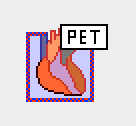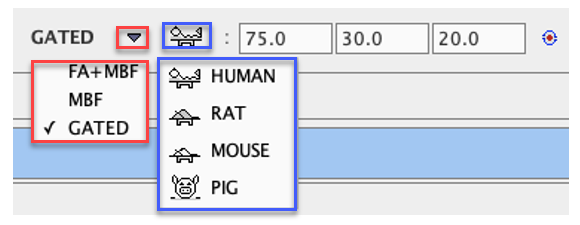Starting the PCARDP Tool
The PCARDP tool is started with the Cardiac PET button from the Application Bar:

or by directly dragging image files onto the above button.
Organization of the PCARDP User Interface
The user interface of PCARDP consists of four pages which can be selected by tabs. The color layout and pages name change based on the analysis scenario.
Particularly we have a common interface for the dynamic and static PET analysis as illustrated below:

1.Load page: This page for loading the data is only available when the Use first page DATABASE loader is enabled in the main PMOD configuration.
2.Reorientation page: This page serves for the spatial reorientation of the data to the standard short axis orientation and the definition of the myocardial segments.
3.Kinetic Modeling page: This page deals with the kinetic modeling of the segmental TACs, the parametric mapping and the exploration of the results.
4.Compare page: This page allows comparing the stress and rest outcome as well as the comparison with a normal database, if one is available.
The interface slightly changes for the gated analysis:

1.DB Load page: This page for loading the data is only available when the the Use first page DATABASE loader is enabled in the main PMOD configuration.
2.Reorientation page: This page serves for the spatial reorientation of the data to the standard short axis orientation and the definition of the myocardial segments.
3.GATED Analysis: This page allows exploration of the results and deals with the gated analysis.
4.Compare page: This page allows comparing various stress and rest gated analysis outcomes.
Step-Wise Processing
Data processing is organized by a stepwise progression from one page to the next towards the end result. On each processing stage the user has to take some action such as data loading, alignment inspection or parameter configuration, and then start the next processing step with the action button located in the lower right. As soon as the result is calculated, it will be shown on a new page representing the new processing stage. To repeat a calculation with modified parameters, the action button in the lower right has to be activated again.
Processing Mode
The main switch between the different processing mode is located in the top menu line, offering the selections FA+MBF (for water PET), MBF (perfusion tracers and FDG), and GATED. The second switch between HUMAN, RAT, MOUSE and PIG initializes the configuration settings to values optimized for the corresponding species. These values are representing the heart model size.

Use the first two text fields to modify the size length and radius of the heart model VOI. The last field is dedicated to the definition of the wall thickness. All values are in [mm].
To define the heart model VOI size selectively for the stress and rest studies use the indicated icon to Define model size interactively:
![]()
The model size will be updated according to the changes in the display.
With the View model size VOI box enabled a green VOI in short axis orientation appears overlaid on the images. It is used to approximate the model settings before the segmentation is performed.
The green model VOI may be used as guidance for the interactive manual short axis orientation.
Convenience Buttons
In some places the following buttons appear:
|
Hide some of the user interface elements to free some space. With the panel hidden, the icon changes to |
|
Reset the parameters to their default values. |
|
Display help information. |
Clearing Studies
When new data is loaded, the previous data and results are cleared. However, it is also possible to explicitly reset the tool closing all image series in the PCARDP tool with Close all studies ![]() button available on the lateral taskbar. Alternatively, this can be done selectively for STRESS and REST series by selecting the X button to the right of the image.
button available on the lateral taskbar. Alternatively, this can be done selectively for STRESS and REST series by selecting the X button to the right of the image.
![]()